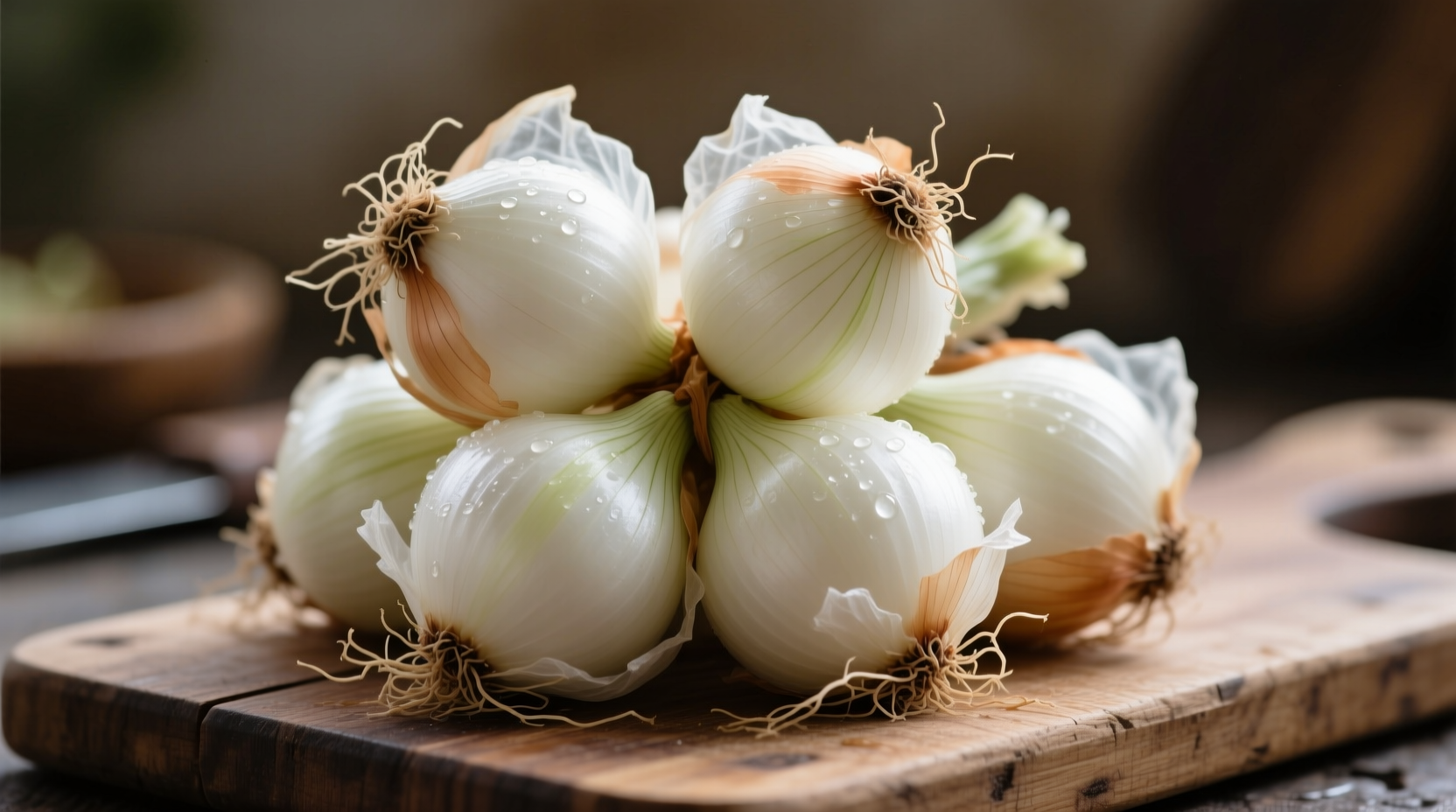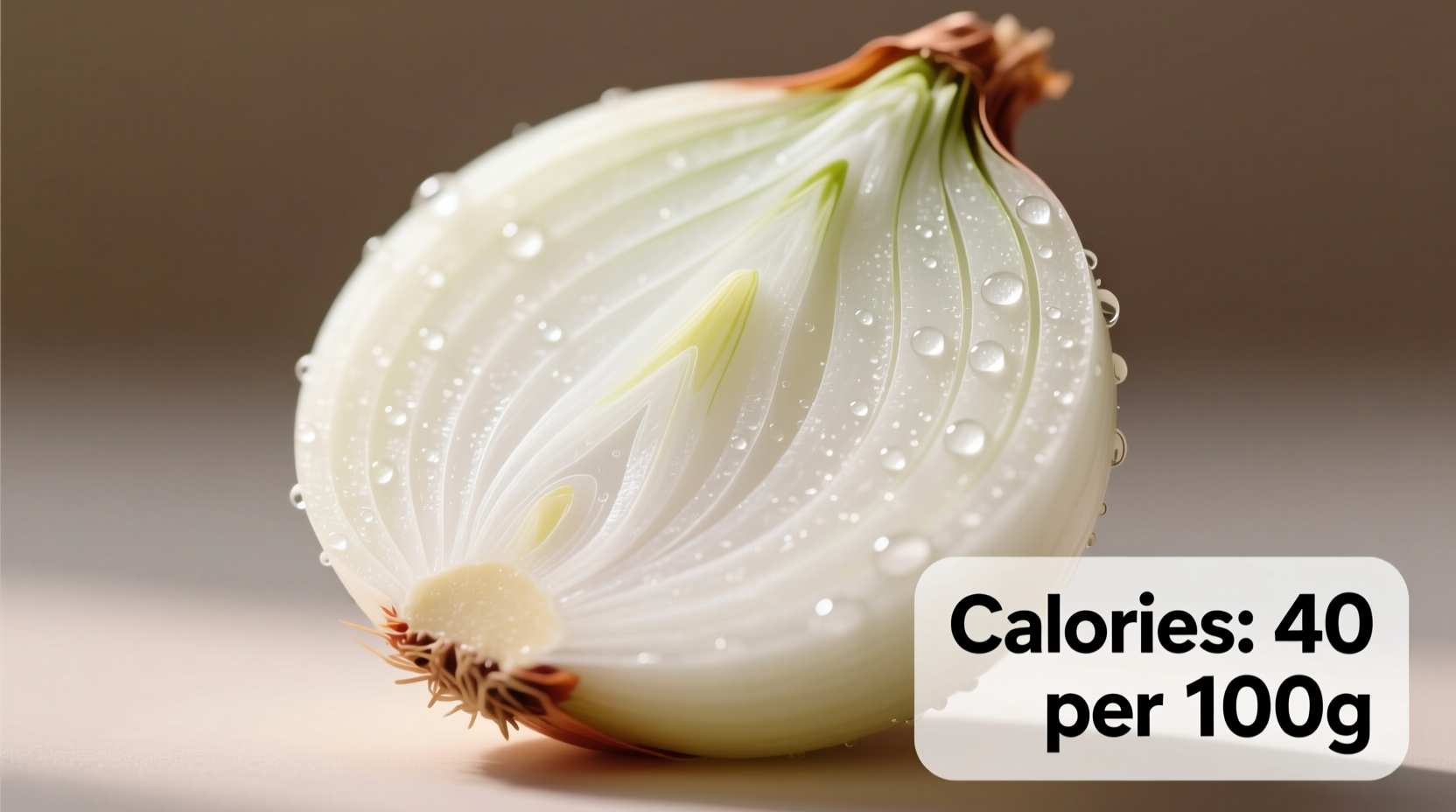A medium white onion (148g) contains approximately 64 calories, with 15g of carbohydrates, 2.7g of fiber, and virtually no fat. This comprehensive guide breaks down the exact nutritional profile, compares white onions to other varieties, and shows how to incorporate them into your diet.
When you're tracking your daily nutrition or planning meals, knowing the exact calorie content of ingredients matters. White onions are a kitchen staple worldwide, but their nutritional value often gets overlooked. Let's cut through the confusion with precise, science-backed information you can use immediately.
White Onion Nutrition: The Complete Breakdown
According to the USDA FoodData Central database, white onions deliver essential nutrients with minimal calories. Here's the detailed nutritional profile per 100g serving:
| Nutrient | Amount | % Daily Value* |
|---|---|---|
| Calories | 40 kcal | 2% |
| Total Carbohydrate | 9.3g | 3% |
| Dietary Fiber | 1.8g | 6% |
| Sugars | 4.2g | - |
| Protein | 1.1g | 2% |
| Vitamin C | 7.4mg | 8% |
| Folate (B9) | 19μg | 5% |
| Potassium | 146mg | 3% |
*Percent Daily Values based on a 2,000 calorie diet. Source: USDA FoodData Central
For practical meal planning, consider these real-world portions:
- 1 small white onion (78g): 31 calories
- 1 medium white onion (148g): 64 calories
- 1 cup chopped (160g): 64 calories
- 1 tablespoon raw (15g): 6 calories
White Onion vs. Red and Yellow: Nutritional Differences
Many home cooks wonder if different onion colors offer distinct nutritional benefits. The USDA database confirms minor but meaningful differences:
| Nutrient | White Onion | Yellow Onion | Red Onion |
|---|---|---|---|
| Calories (per 100g) | 40 | 40 | 40 |
| Carbohydrates | 9.3g | 9.3g | 9.3g |
| Fiber | 1.8g | 1.7g | 2.0g |
| Vitamin C | 7.4mg | 7.4mg | 11.8mg |
| Antioxidants | Moderate | Moderate | High (anthocyanins) |
Source: USDA FoodData Central comparison of Allium cepa varieties
While calorie counts remain nearly identical across varieties, red onions contain higher levels of anthocyanins (the pigments giving them color) which function as powerful antioxidants. White onions typically have a slightly milder flavor and thinner skin than yellow varieties, making them preferred for raw applications in many culinary traditions.

How Cooking Affects White Onion Nutrition
Understanding how preparation methods impact nutritional value helps maximize benefits. Research published in the Journal of Agricultural and Food Chemistry shows:
- Raw consumption: Preserves maximum vitamin C and sulfur compounds
- Light sautéing (3-5 minutes): Retains about 80% of original nutrients
- Extended boiling (10+ minutes): Can reduce water-soluble vitamins by up to 30%
- Caramelizing: Increases sweetness through natural sugar concentration but doesn't add calories
Professional chefs like those at the Culinary Institute of America recommend cooking white onions just until translucent to maintain optimal nutrient retention while developing flavor.
Practical Applications in Your Diet
White onions fit seamlessly into various eating patterns. Here's how to leverage their nutritional profile:
For Weight Management
With only 64 calories per medium onion, white onions add volume and flavor to dishes without significant caloric impact. Try these strategies:
- Add raw diced white onion to salads for crunch (6 calories per tablespoon)
- Use as a base for low-calorie soups and stews
- Replace higher-calorie toppings with grilled white onions
For Blood Sugar Management
The American Diabetes Association recognizes onions as a diabetes-friendly food due to their low glycemic load (GL=2). The chromium content may help improve insulin sensitivity according to research in Nutrition Research Reviews.
For Gut Health
White onions contain inulin, a prebiotic fiber that feeds beneficial gut bacteria. Consuming 5-10g daily (about 1/2 to 1 medium onion) supports microbiome diversity as noted in studies published in Nutrients journal.
Common Misconceptions About Onion Nutrition
Several myths persist about onion calories and nutrition:
- Myth: Cooking onions significantly increases calories
Fact: Caramelizing concentrates natural sugars but doesn't add calories - 1 cup cooked still contains about 64 calories - Myth: White onions are less nutritious than colored varieties
Fact: While red onions have more anthocyanins, white onions contain comparable levels of sulfur compounds with potential health benefits - Myth: Onion calories differ based on growing region
Fact: USDA data shows consistent nutritional profiles across commercially grown varieties regardless of origin
Maximizing Nutritional Benefits: Chef's Tips
Professional chefs maximize white onion nutrition through these techniques:
- Leave the outer layers: The two outer layers contain the highest concentration of flavonoids. Only remove papery skin.
- Cut properly: Slice perpendicular to fiber lines to minimize cell damage and nutrient loss.
- Combine with healthy fats: Pair with olive oil to enhance absorption of fat-soluble compounds.
- Use the whole onion: Even root ends contain beneficial compounds - add to stocks.
Remember that individual nutritional needs vary based on age, activity level, and health conditions. The Academy of Nutrition and Dietetics recommends consulting a registered dietitian for personalized nutrition planning.











 浙公网安备
33010002000092号
浙公网安备
33010002000092号 浙B2-20120091-4
浙B2-20120091-4